Analysis of SME's, Entrepreneurship and the UK Economy
VerifiedAdded on 2023/01/12
|16
|4621
|97
Report
AI Summary
This comprehensive report delves into the crucial role of Small and Medium Enterprises (SMEs) and entrepreneurship within the UK economy. It begins by defining the concept of SMEs and then assesses their growth and financial contributions, analyzing their significance in the national economic landscape. The report further explores the distinctions between entrepreneurs and managers, highlighting the essential entrepreneurial characteristics and skills required for success. It also examines the Big Five model of personality, the correlation between entrepreneurial traits and success, and factors that either foster or hinder entrepreneurial endeavors. Additionally, the report investigates the impact of background and experience on entrepreneurship, providing a holistic view of the subject. The report includes comparisons of SME impacts across regions and industries, such as Scotland, England, Northern Ireland, the retail and construction sectors, and international comparisons with Germany and Spain. The report also discusses the differences between entrepreneurs and managers. The report explores the characteristics of successful entrepreneurs and the factors that can influence their success, providing a detailed analysis of this crucial area of business.

Report
Paraphrase This Document
Need a fresh take? Get an instant paraphrase of this document with our AI Paraphraser
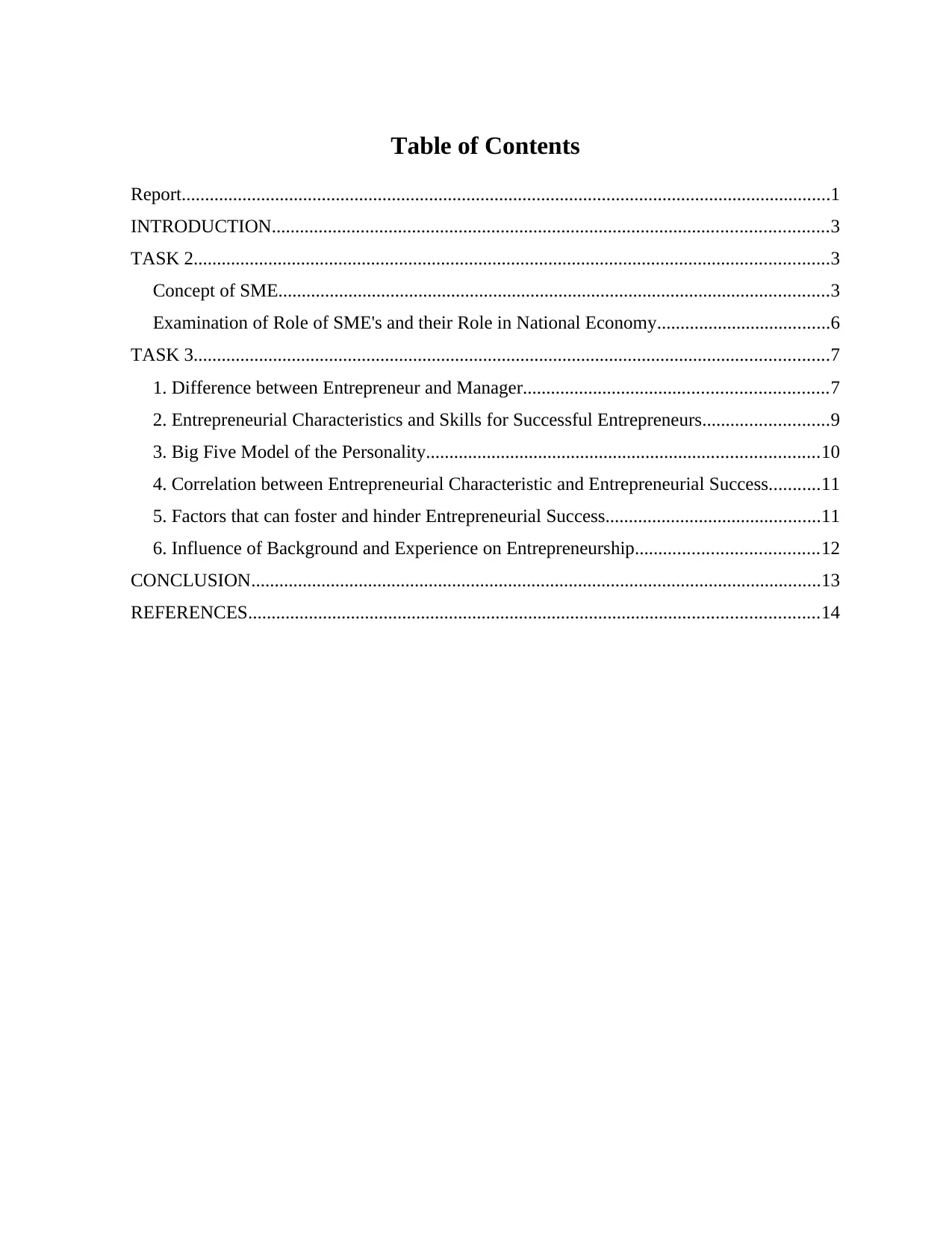
Table of Contents
Report...........................................................................................................................................1
INTRODUCTION.......................................................................................................................3
TASK 2........................................................................................................................................3
Concept of SME......................................................................................................................3
Examination of Role of SME's and their Role in National Economy.....................................6
TASK 3........................................................................................................................................7
1. Difference between Entrepreneur and Manager.................................................................7
2. Entrepreneurial Characteristics and Skills for Successful Entrepreneurs...........................9
3. Big Five Model of the Personality....................................................................................10
4. Correlation between Entrepreneurial Characteristic and Entrepreneurial Success...........11
5. Factors that can foster and hinder Entrepreneurial Success..............................................11
6. Influence of Background and Experience on Entrepreneurship.......................................12
CONCLUSION..........................................................................................................................13
REFERENCES..........................................................................................................................14
Report...........................................................................................................................................1
INTRODUCTION.......................................................................................................................3
TASK 2........................................................................................................................................3
Concept of SME......................................................................................................................3
Examination of Role of SME's and their Role in National Economy.....................................6
TASK 3........................................................................................................................................7
1. Difference between Entrepreneur and Manager.................................................................7
2. Entrepreneurial Characteristics and Skills for Successful Entrepreneurs...........................9
3. Big Five Model of the Personality....................................................................................10
4. Correlation between Entrepreneurial Characteristic and Entrepreneurial Success...........11
5. Factors that can foster and hinder Entrepreneurial Success..............................................11
6. Influence of Background and Experience on Entrepreneurship.......................................12
CONCLUSION..........................................................................................................................13
REFERENCES..........................................................................................................................14
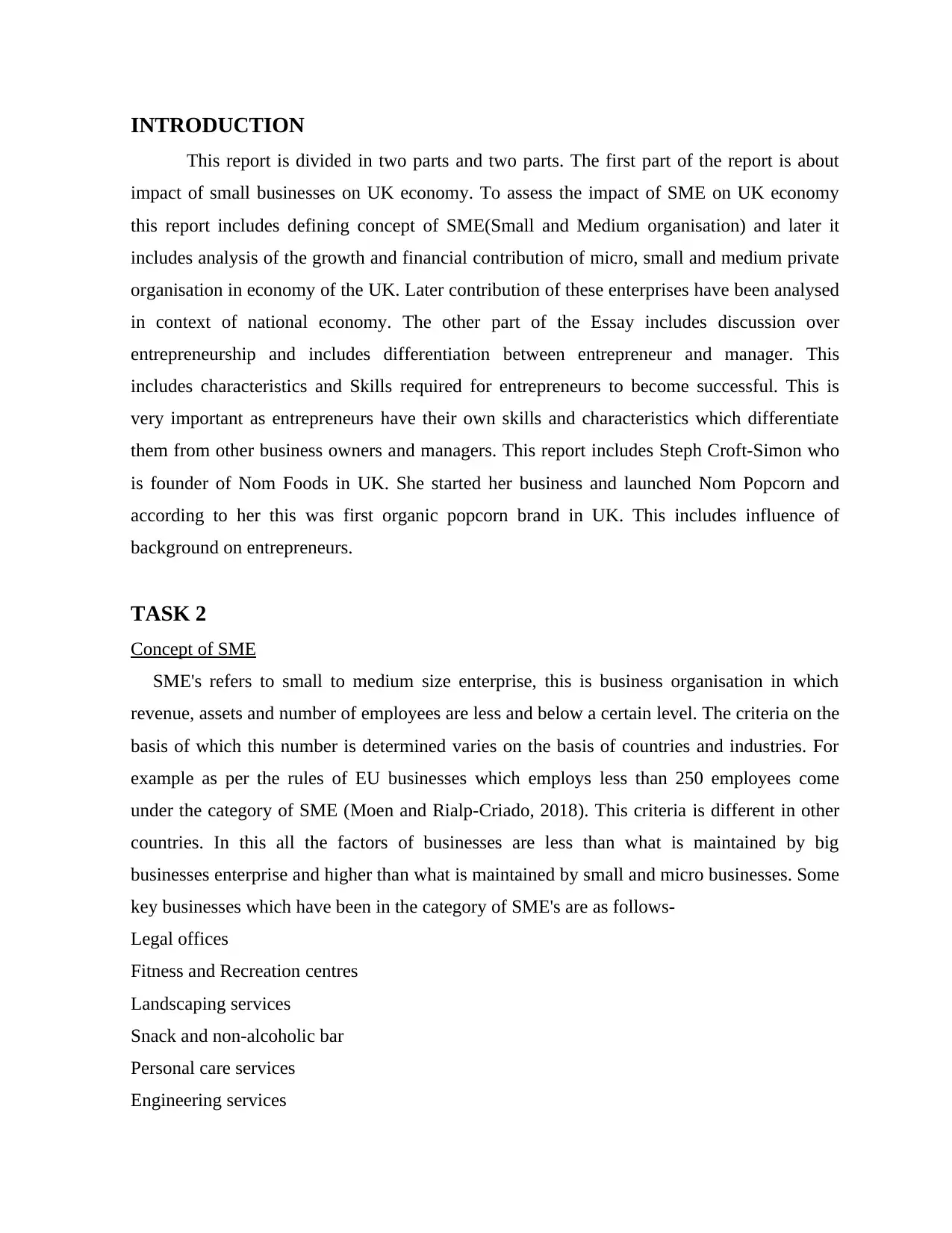
INTRODUCTION
This report is divided in two parts and two parts. The first part of the report is about
impact of small businesses on UK economy. To assess the impact of SME on UK economy
this report includes defining concept of SME(Small and Medium organisation) and later it
includes analysis of the growth and financial contribution of micro, small and medium private
organisation in economy of the UK. Later contribution of these enterprises have been analysed
in context of national economy. The other part of the Essay includes discussion over
entrepreneurship and includes differentiation between entrepreneur and manager. This
includes characteristics and Skills required for entrepreneurs to become successful. This is
very important as entrepreneurs have their own skills and characteristics which differentiate
them from other business owners and managers. This report includes Steph Croft-Simon who
is founder of Nom Foods in UK. She started her business and launched Nom Popcorn and
according to her this was first organic popcorn brand in UK. This includes influence of
background on entrepreneurs.
TASK 2
Concept of SME
SME's refers to small to medium size enterprise, this is business organisation in which
revenue, assets and number of employees are less and below a certain level. The criteria on the
basis of which this number is determined varies on the basis of countries and industries. For
example as per the rules of EU businesses which employs less than 250 employees come
under the category of SME (Moen and Rialp-Criado, 2018). This criteria is different in other
countries. In this all the factors of businesses are less than what is maintained by big
businesses enterprise and higher than what is maintained by small and micro businesses. Some
key businesses which have been in the category of SME's are as follows-
Legal offices
Fitness and Recreation centres
Landscaping services
Snack and non-alcoholic bar
Personal care services
Engineering services
This report is divided in two parts and two parts. The first part of the report is about
impact of small businesses on UK economy. To assess the impact of SME on UK economy
this report includes defining concept of SME(Small and Medium organisation) and later it
includes analysis of the growth and financial contribution of micro, small and medium private
organisation in economy of the UK. Later contribution of these enterprises have been analysed
in context of national economy. The other part of the Essay includes discussion over
entrepreneurship and includes differentiation between entrepreneur and manager. This
includes characteristics and Skills required for entrepreneurs to become successful. This is
very important as entrepreneurs have their own skills and characteristics which differentiate
them from other business owners and managers. This report includes Steph Croft-Simon who
is founder of Nom Foods in UK. She started her business and launched Nom Popcorn and
according to her this was first organic popcorn brand in UK. This includes influence of
background on entrepreneurs.
TASK 2
Concept of SME
SME's refers to small to medium size enterprise, this is business organisation in which
revenue, assets and number of employees are less and below a certain level. The criteria on the
basis of which this number is determined varies on the basis of countries and industries. For
example as per the rules of EU businesses which employs less than 250 employees come
under the category of SME (Moen and Rialp-Criado, 2018). This criteria is different in other
countries. In this all the factors of businesses are less than what is maintained by big
businesses enterprise and higher than what is maintained by small and micro businesses. Some
key businesses which have been in the category of SME's are as follows-
Legal offices
Fitness and Recreation centres
Landscaping services
Snack and non-alcoholic bar
Personal care services
Engineering services
⊘ This is a preview!⊘
Do you want full access?
Subscribe today to unlock all pages.

Trusted by 1+ million students worldwide
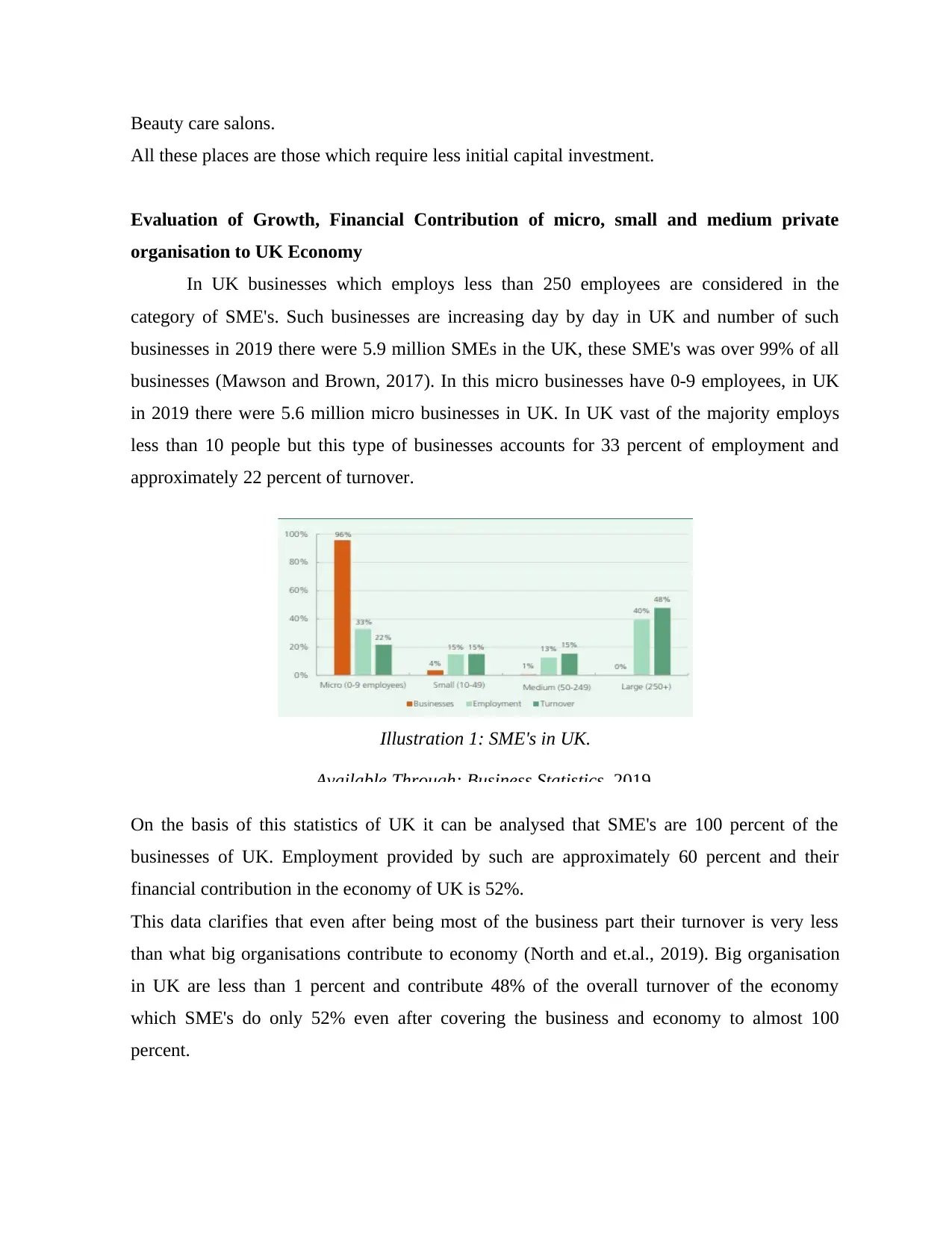
Beauty care salons.
All these places are those which require less initial capital investment.
Evaluation of Growth, Financial Contribution of micro, small and medium private
organisation to UK Economy
In UK businesses which employs less than 250 employees are considered in the
category of SME's. Such businesses are increasing day by day in UK and number of such
businesses in 2019 there were 5.9 million SMEs in the UK, these SME's was over 99% of all
businesses (Mawson and Brown, 2017). In this micro businesses have 0-9 employees, in UK
in 2019 there were 5.6 million micro businesses in UK. In UK vast of the majority employs
less than 10 people but this type of businesses accounts for 33 percent of employment and
approximately 22 percent of turnover.
On the basis of this statistics of UK it can be analysed that SME's are 100 percent of the
businesses of UK. Employment provided by such are approximately 60 percent and their
financial contribution in the economy of UK is 52%.
This data clarifies that even after being most of the business part their turnover is very less
than what big organisations contribute to economy (North and et.al., 2019). Big organisation
in UK are less than 1 percent and contribute 48% of the overall turnover of the economy
which SME's do only 52% even after covering the business and economy to almost 100
percent.
Illustration 1: SME's in UK.
Available Through: Business Statistics, 2019.
All these places are those which require less initial capital investment.
Evaluation of Growth, Financial Contribution of micro, small and medium private
organisation to UK Economy
In UK businesses which employs less than 250 employees are considered in the
category of SME's. Such businesses are increasing day by day in UK and number of such
businesses in 2019 there were 5.9 million SMEs in the UK, these SME's was over 99% of all
businesses (Mawson and Brown, 2017). In this micro businesses have 0-9 employees, in UK
in 2019 there were 5.6 million micro businesses in UK. In UK vast of the majority employs
less than 10 people but this type of businesses accounts for 33 percent of employment and
approximately 22 percent of turnover.
On the basis of this statistics of UK it can be analysed that SME's are 100 percent of the
businesses of UK. Employment provided by such are approximately 60 percent and their
financial contribution in the economy of UK is 52%.
This data clarifies that even after being most of the business part their turnover is very less
than what big organisations contribute to economy (North and et.al., 2019). Big organisation
in UK are less than 1 percent and contribute 48% of the overall turnover of the economy
which SME's do only 52% even after covering the business and economy to almost 100
percent.
Illustration 1: SME's in UK.
Available Through: Business Statistics, 2019.
Paraphrase This Document
Need a fresh take? Get an instant paraphrase of this document with our AI Paraphraser
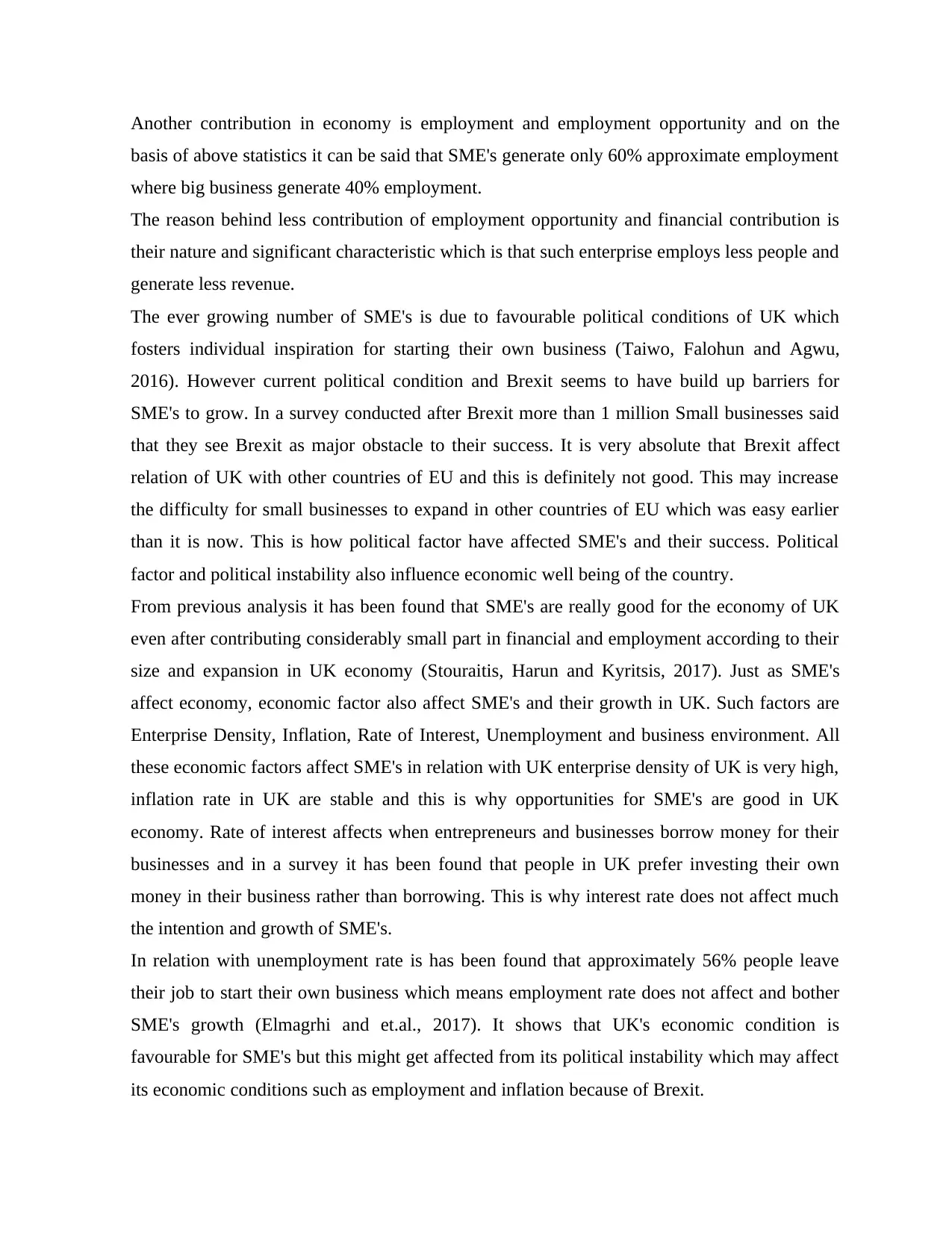
Another contribution in economy is employment and employment opportunity and on the
basis of above statistics it can be said that SME's generate only 60% approximate employment
where big business generate 40% employment.
The reason behind less contribution of employment opportunity and financial contribution is
their nature and significant characteristic which is that such enterprise employs less people and
generate less revenue.
The ever growing number of SME's is due to favourable political conditions of UK which
fosters individual inspiration for starting their own business (Taiwo, Falohun and Agwu,
2016). However current political condition and Brexit seems to have build up barriers for
SME's to grow. In a survey conducted after Brexit more than 1 million Small businesses said
that they see Brexit as major obstacle to their success. It is very absolute that Brexit affect
relation of UK with other countries of EU and this is definitely not good. This may increase
the difficulty for small businesses to expand in other countries of EU which was easy earlier
than it is now. This is how political factor have affected SME's and their success. Political
factor and political instability also influence economic well being of the country.
From previous analysis it has been found that SME's are really good for the economy of UK
even after contributing considerably small part in financial and employment according to their
size and expansion in UK economy (Stouraitis, Harun and Kyritsis, 2017). Just as SME's
affect economy, economic factor also affect SME's and their growth in UK. Such factors are
Enterprise Density, Inflation, Rate of Interest, Unemployment and business environment. All
these economic factors affect SME's in relation with UK enterprise density of UK is very high,
inflation rate in UK are stable and this is why opportunities for SME's are good in UK
economy. Rate of interest affects when entrepreneurs and businesses borrow money for their
businesses and in a survey it has been found that people in UK prefer investing their own
money in their business rather than borrowing. This is why interest rate does not affect much
the intention and growth of SME's.
In relation with unemployment rate is has been found that approximately 56% people leave
their job to start their own business which means employment rate does not affect and bother
SME's growth (Elmagrhi and et.al., 2017). It shows that UK's economic condition is
favourable for SME's but this might get affected from its political instability which may affect
its economic conditions such as employment and inflation because of Brexit.
basis of above statistics it can be said that SME's generate only 60% approximate employment
where big business generate 40% employment.
The reason behind less contribution of employment opportunity and financial contribution is
their nature and significant characteristic which is that such enterprise employs less people and
generate less revenue.
The ever growing number of SME's is due to favourable political conditions of UK which
fosters individual inspiration for starting their own business (Taiwo, Falohun and Agwu,
2016). However current political condition and Brexit seems to have build up barriers for
SME's to grow. In a survey conducted after Brexit more than 1 million Small businesses said
that they see Brexit as major obstacle to their success. It is very absolute that Brexit affect
relation of UK with other countries of EU and this is definitely not good. This may increase
the difficulty for small businesses to expand in other countries of EU which was easy earlier
than it is now. This is how political factor have affected SME's and their success. Political
factor and political instability also influence economic well being of the country.
From previous analysis it has been found that SME's are really good for the economy of UK
even after contributing considerably small part in financial and employment according to their
size and expansion in UK economy (Stouraitis, Harun and Kyritsis, 2017). Just as SME's
affect economy, economic factor also affect SME's and their growth in UK. Such factors are
Enterprise Density, Inflation, Rate of Interest, Unemployment and business environment. All
these economic factors affect SME's in relation with UK enterprise density of UK is very high,
inflation rate in UK are stable and this is why opportunities for SME's are good in UK
economy. Rate of interest affects when entrepreneurs and businesses borrow money for their
businesses and in a survey it has been found that people in UK prefer investing their own
money in their business rather than borrowing. This is why interest rate does not affect much
the intention and growth of SME's.
In relation with unemployment rate is has been found that approximately 56% people leave
their job to start their own business which means employment rate does not affect and bother
SME's growth (Elmagrhi and et.al., 2017). It shows that UK's economic condition is
favourable for SME's but this might get affected from its political instability which may affect
its economic conditions such as employment and inflation because of Brexit.
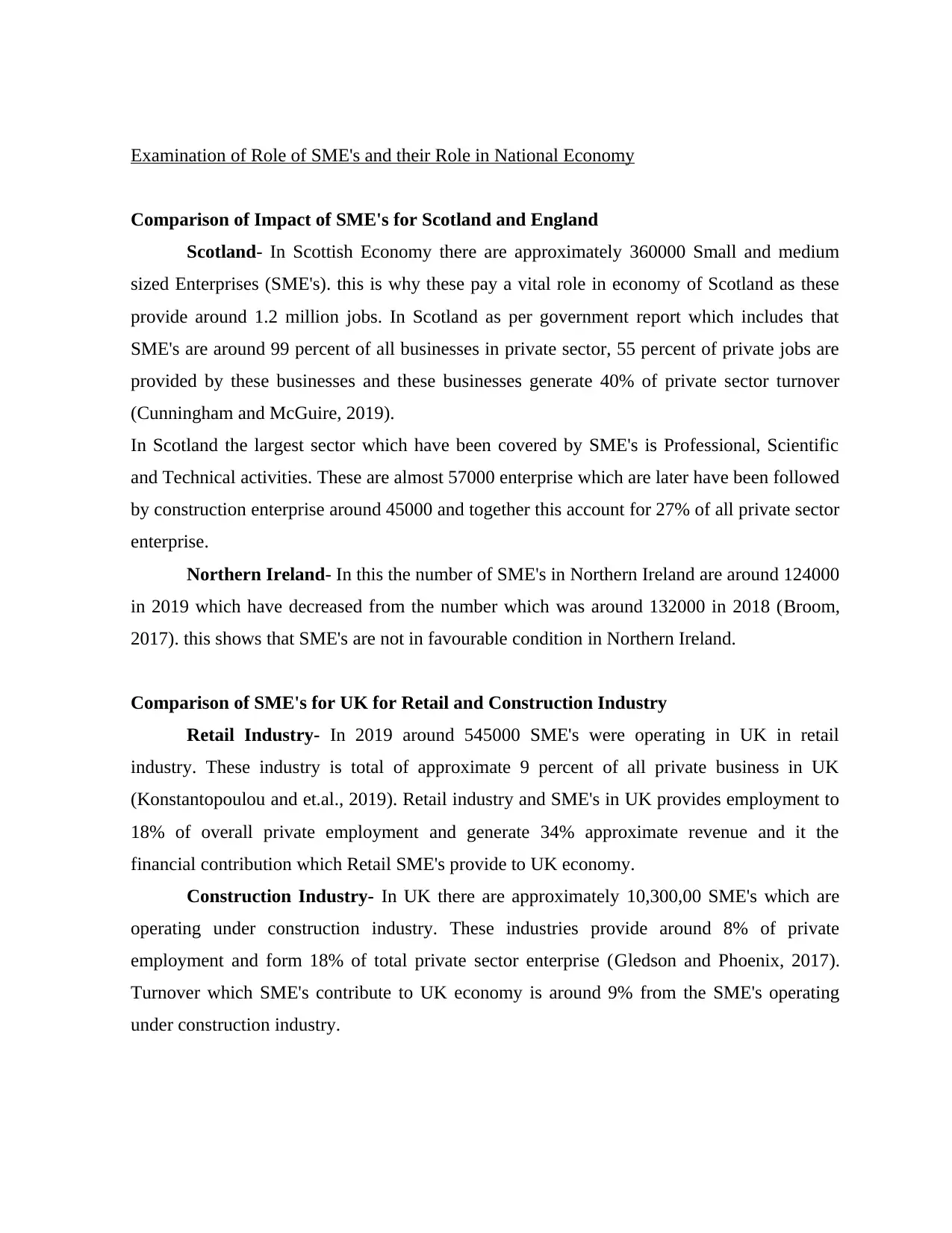
Examination of Role of SME's and their Role in National Economy
Comparison of Impact of SME's for Scotland and England
Scotland- In Scottish Economy there are approximately 360000 Small and medium
sized Enterprises (SME's). this is why these pay a vital role in economy of Scotland as these
provide around 1.2 million jobs. In Scotland as per government report which includes that
SME's are around 99 percent of all businesses in private sector, 55 percent of private jobs are
provided by these businesses and these businesses generate 40% of private sector turnover
(Cunningham and McGuire, 2019).
In Scotland the largest sector which have been covered by SME's is Professional, Scientific
and Technical activities. These are almost 57000 enterprise which are later have been followed
by construction enterprise around 45000 and together this account for 27% of all private sector
enterprise.
Northern Ireland- In this the number of SME's in Northern Ireland are around 124000
in 2019 which have decreased from the number which was around 132000 in 2018 (Broom,
2017). this shows that SME's are not in favourable condition in Northern Ireland.
Comparison of SME's for UK for Retail and Construction Industry
Retail Industry- In 2019 around 545000 SME's were operating in UK in retail
industry. These industry is total of approximate 9 percent of all private business in UK
(Konstantopoulou and et.al., 2019). Retail industry and SME's in UK provides employment to
18% of overall private employment and generate 34% approximate revenue and it the
financial contribution which Retail SME's provide to UK economy.
Construction Industry- In UK there are approximately 10,300,00 SME's which are
operating under construction industry. These industries provide around 8% of private
employment and form 18% of total private sector enterprise (Gledson and Phoenix, 2017).
Turnover which SME's contribute to UK economy is around 9% from the SME's operating
under construction industry.
Comparison of Impact of SME's for Scotland and England
Scotland- In Scottish Economy there are approximately 360000 Small and medium
sized Enterprises (SME's). this is why these pay a vital role in economy of Scotland as these
provide around 1.2 million jobs. In Scotland as per government report which includes that
SME's are around 99 percent of all businesses in private sector, 55 percent of private jobs are
provided by these businesses and these businesses generate 40% of private sector turnover
(Cunningham and McGuire, 2019).
In Scotland the largest sector which have been covered by SME's is Professional, Scientific
and Technical activities. These are almost 57000 enterprise which are later have been followed
by construction enterprise around 45000 and together this account for 27% of all private sector
enterprise.
Northern Ireland- In this the number of SME's in Northern Ireland are around 124000
in 2019 which have decreased from the number which was around 132000 in 2018 (Broom,
2017). this shows that SME's are not in favourable condition in Northern Ireland.
Comparison of SME's for UK for Retail and Construction Industry
Retail Industry- In 2019 around 545000 SME's were operating in UK in retail
industry. These industry is total of approximate 9 percent of all private business in UK
(Konstantopoulou and et.al., 2019). Retail industry and SME's in UK provides employment to
18% of overall private employment and generate 34% approximate revenue and it the
financial contribution which Retail SME's provide to UK economy.
Construction Industry- In UK there are approximately 10,300,00 SME's which are
operating under construction industry. These industries provide around 8% of private
employment and form 18% of total private sector enterprise (Gledson and Phoenix, 2017).
Turnover which SME's contribute to UK economy is around 9% from the SME's operating
under construction industry.
⊘ This is a preview!⊘
Do you want full access?
Subscribe today to unlock all pages.

Trusted by 1+ million students worldwide
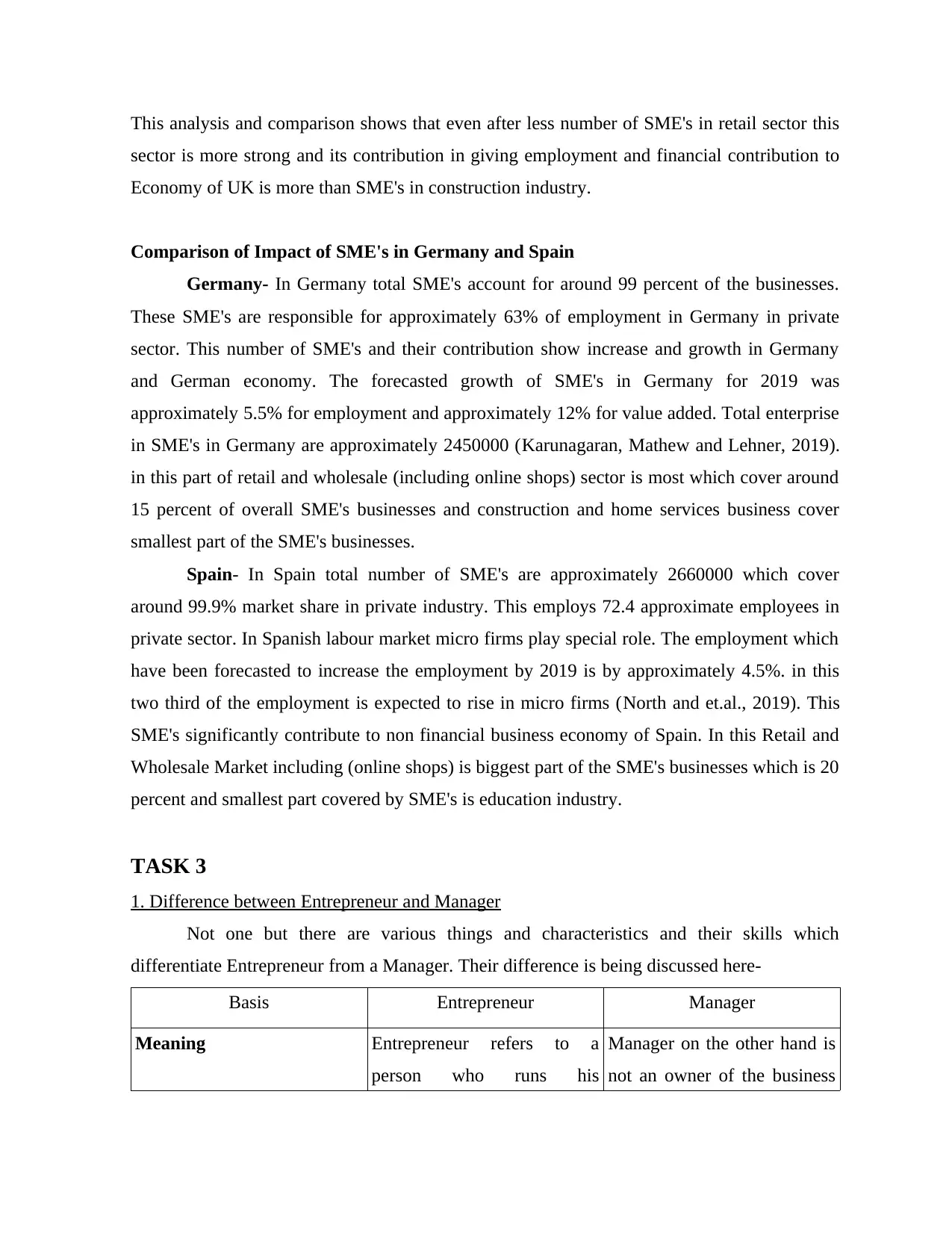
This analysis and comparison shows that even after less number of SME's in retail sector this
sector is more strong and its contribution in giving employment and financial contribution to
Economy of UK is more than SME's in construction industry.
Comparison of Impact of SME's in Germany and Spain
Germany- In Germany total SME's account for around 99 percent of the businesses.
These SME's are responsible for approximately 63% of employment in Germany in private
sector. This number of SME's and their contribution show increase and growth in Germany
and German economy. The forecasted growth of SME's in Germany for 2019 was
approximately 5.5% for employment and approximately 12% for value added. Total enterprise
in SME's in Germany are approximately 2450000 (Karunagaran, Mathew and Lehner, 2019).
in this part of retail and wholesale (including online shops) sector is most which cover around
15 percent of overall SME's businesses and construction and home services business cover
smallest part of the SME's businesses.
Spain- In Spain total number of SME's are approximately 2660000 which cover
around 99.9% market share in private industry. This employs 72.4 approximate employees in
private sector. In Spanish labour market micro firms play special role. The employment which
have been forecasted to increase the employment by 2019 is by approximately 4.5%. in this
two third of the employment is expected to rise in micro firms (North and et.al., 2019). This
SME's significantly contribute to non financial business economy of Spain. In this Retail and
Wholesale Market including (online shops) is biggest part of the SME's businesses which is 20
percent and smallest part covered by SME's is education industry.
TASK 3
1. Difference between Entrepreneur and Manager
Not one but there are various things and characteristics and their skills which
differentiate Entrepreneur from a Manager. Their difference is being discussed here-
Basis Entrepreneur Manager
Meaning Entrepreneur refers to a
person who runs his
Manager on the other hand is
not an owner of the business
sector is more strong and its contribution in giving employment and financial contribution to
Economy of UK is more than SME's in construction industry.
Comparison of Impact of SME's in Germany and Spain
Germany- In Germany total SME's account for around 99 percent of the businesses.
These SME's are responsible for approximately 63% of employment in Germany in private
sector. This number of SME's and their contribution show increase and growth in Germany
and German economy. The forecasted growth of SME's in Germany for 2019 was
approximately 5.5% for employment and approximately 12% for value added. Total enterprise
in SME's in Germany are approximately 2450000 (Karunagaran, Mathew and Lehner, 2019).
in this part of retail and wholesale (including online shops) sector is most which cover around
15 percent of overall SME's businesses and construction and home services business cover
smallest part of the SME's businesses.
Spain- In Spain total number of SME's are approximately 2660000 which cover
around 99.9% market share in private industry. This employs 72.4 approximate employees in
private sector. In Spanish labour market micro firms play special role. The employment which
have been forecasted to increase the employment by 2019 is by approximately 4.5%. in this
two third of the employment is expected to rise in micro firms (North and et.al., 2019). This
SME's significantly contribute to non financial business economy of Spain. In this Retail and
Wholesale Market including (online shops) is biggest part of the SME's businesses which is 20
percent and smallest part covered by SME's is education industry.
TASK 3
1. Difference between Entrepreneur and Manager
Not one but there are various things and characteristics and their skills which
differentiate Entrepreneur from a Manager. Their difference is being discussed here-
Basis Entrepreneur Manager
Meaning Entrepreneur refers to a
person who runs his
Manager on the other hand is
not an owner of the business
Paraphrase This Document
Need a fresh take? Get an instant paraphrase of this document with our AI Paraphraser
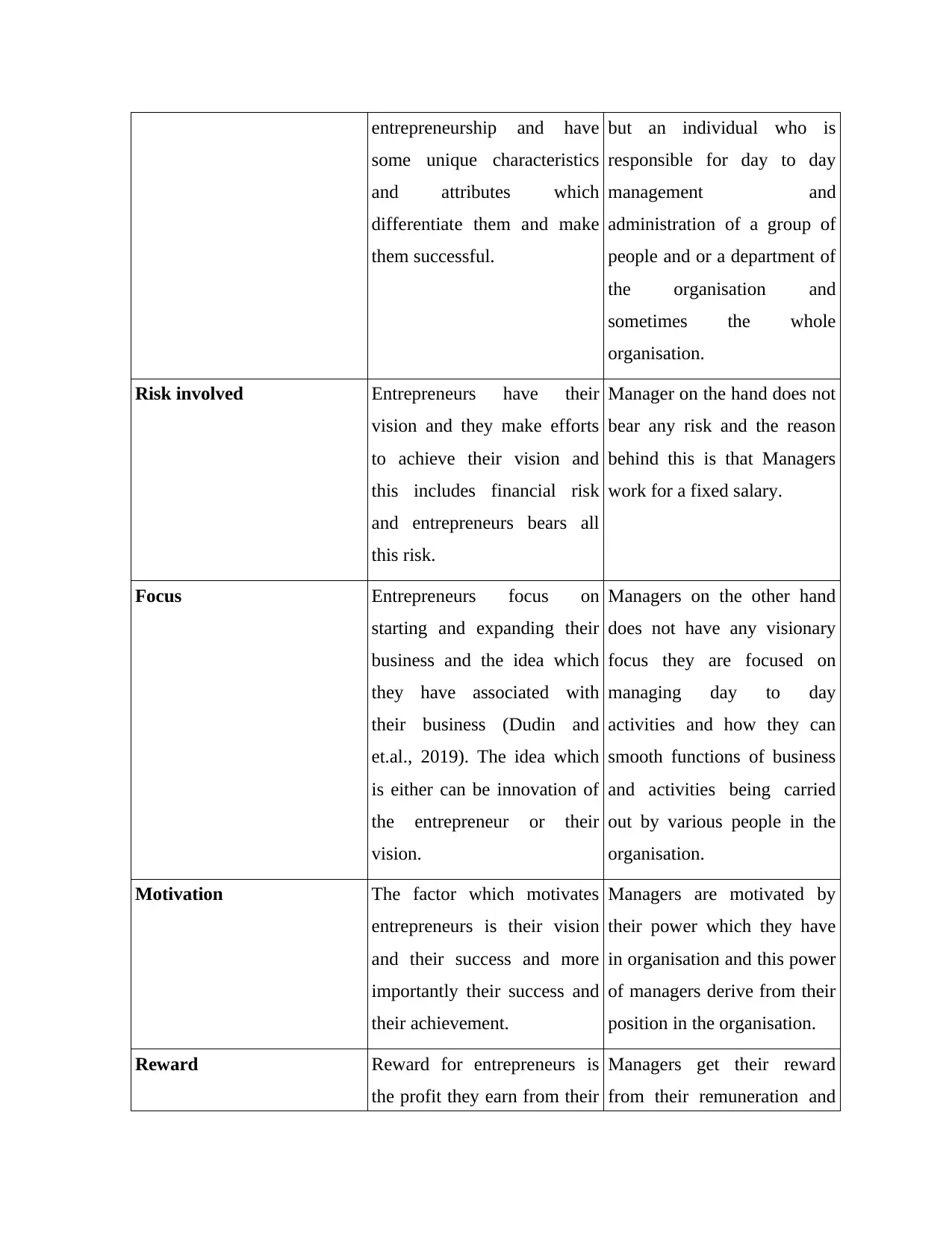
entrepreneurship and have
some unique characteristics
and attributes which
differentiate them and make
them successful.
but an individual who is
responsible for day to day
management and
administration of a group of
people and or a department of
the organisation and
sometimes the whole
organisation.
Risk involved Entrepreneurs have their
vision and they make efforts
to achieve their vision and
this includes financial risk
and entrepreneurs bears all
this risk.
Manager on the hand does not
bear any risk and the reason
behind this is that Managers
work for a fixed salary.
Focus Entrepreneurs focus on
starting and expanding their
business and the idea which
they have associated with
their business (Dudin and
et.al., 2019). The idea which
is either can be innovation of
the entrepreneur or their
vision.
Managers on the other hand
does not have any visionary
focus they are focused on
managing day to day
activities and how they can
smooth functions of business
and activities being carried
out by various people in the
organisation.
Motivation The factor which motivates
entrepreneurs is their vision
and their success and more
importantly their success and
their achievement.
Managers are motivated by
their power which they have
in organisation and this power
of managers derive from their
position in the organisation.
Reward Reward for entrepreneurs is
the profit they earn from their
Managers get their reward
from their remuneration and
some unique characteristics
and attributes which
differentiate them and make
them successful.
but an individual who is
responsible for day to day
management and
administration of a group of
people and or a department of
the organisation and
sometimes the whole
organisation.
Risk involved Entrepreneurs have their
vision and they make efforts
to achieve their vision and
this includes financial risk
and entrepreneurs bears all
this risk.
Manager on the hand does not
bear any risk and the reason
behind this is that Managers
work for a fixed salary.
Focus Entrepreneurs focus on
starting and expanding their
business and the idea which
they have associated with
their business (Dudin and
et.al., 2019). The idea which
is either can be innovation of
the entrepreneur or their
vision.
Managers on the other hand
does not have any visionary
focus they are focused on
managing day to day
activities and how they can
smooth functions of business
and activities being carried
out by various people in the
organisation.
Motivation The factor which motivates
entrepreneurs is their vision
and their success and more
importantly their success and
their achievement.
Managers are motivated by
their power which they have
in organisation and this power
of managers derive from their
position in the organisation.
Reward Reward for entrepreneurs is
the profit they earn from their
Managers get their reward
from their remuneration and
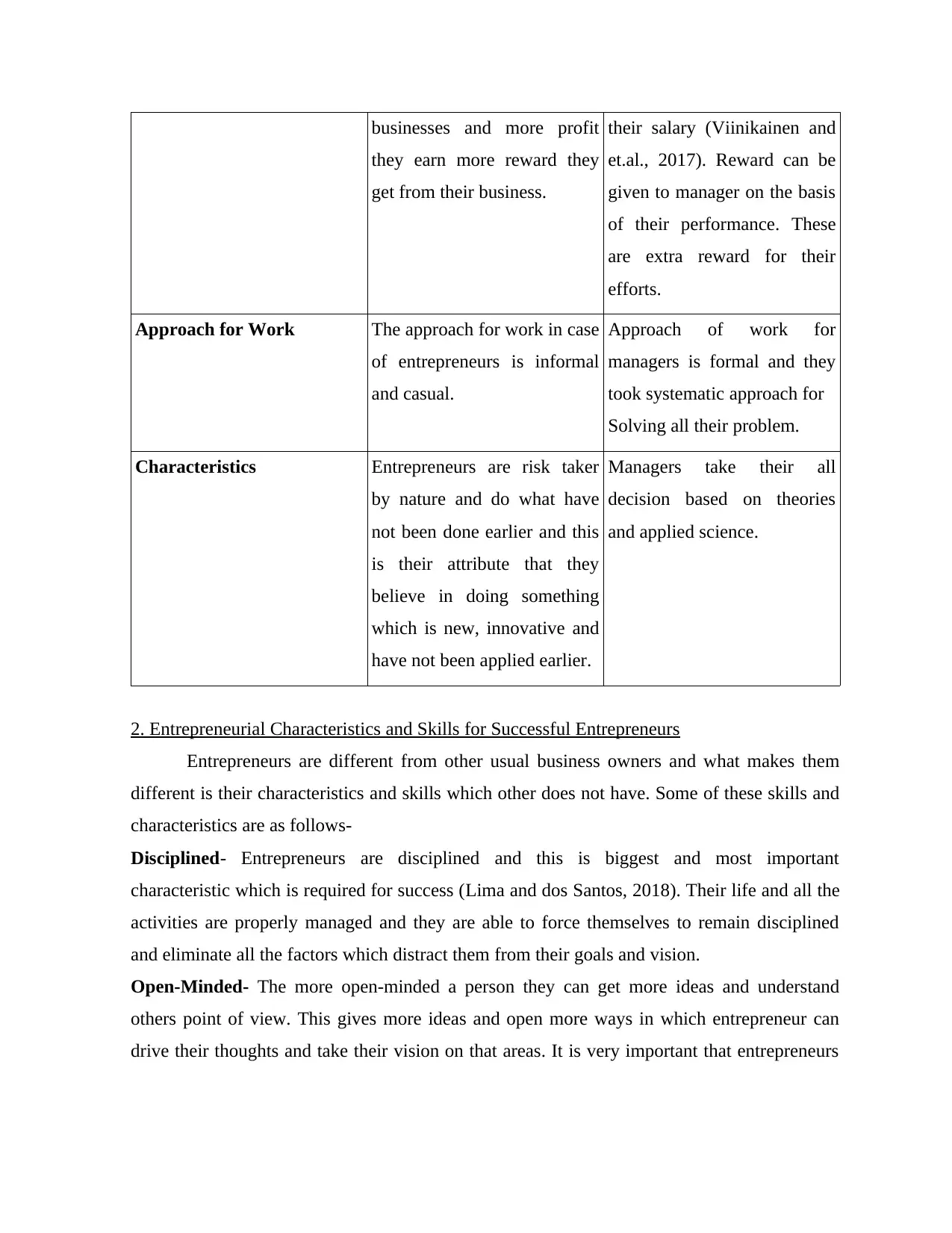
businesses and more profit
they earn more reward they
get from their business.
their salary (Viinikainen and
et.al., 2017). Reward can be
given to manager on the basis
of their performance. These
are extra reward for their
efforts.
Approach for Work The approach for work in case
of entrepreneurs is informal
and casual.
Approach of work for
managers is formal and they
took systematic approach for
Solving all their problem.
Characteristics Entrepreneurs are risk taker
by nature and do what have
not been done earlier and this
is their attribute that they
believe in doing something
which is new, innovative and
have not been applied earlier.
Managers take their all
decision based on theories
and applied science.
2. Entrepreneurial Characteristics and Skills for Successful Entrepreneurs
Entrepreneurs are different from other usual business owners and what makes them
different is their characteristics and skills which other does not have. Some of these skills and
characteristics are as follows-
Disciplined- Entrepreneurs are disciplined and this is biggest and most important
characteristic which is required for success (Lima and dos Santos, 2018). Their life and all the
activities are properly managed and they are able to force themselves to remain disciplined
and eliminate all the factors which distract them from their goals and vision.
Open-Minded- The more open-minded a person they can get more ideas and understand
others point of view. This gives more ideas and open more ways in which entrepreneur can
drive their thoughts and take their vision on that areas. It is very important that entrepreneurs
they earn more reward they
get from their business.
their salary (Viinikainen and
et.al., 2017). Reward can be
given to manager on the basis
of their performance. These
are extra reward for their
efforts.
Approach for Work The approach for work in case
of entrepreneurs is informal
and casual.
Approach of work for
managers is formal and they
took systematic approach for
Solving all their problem.
Characteristics Entrepreneurs are risk taker
by nature and do what have
not been done earlier and this
is their attribute that they
believe in doing something
which is new, innovative and
have not been applied earlier.
Managers take their all
decision based on theories
and applied science.
2. Entrepreneurial Characteristics and Skills for Successful Entrepreneurs
Entrepreneurs are different from other usual business owners and what makes them
different is their characteristics and skills which other does not have. Some of these skills and
characteristics are as follows-
Disciplined- Entrepreneurs are disciplined and this is biggest and most important
characteristic which is required for success (Lima and dos Santos, 2018). Their life and all the
activities are properly managed and they are able to force themselves to remain disciplined
and eliminate all the factors which distract them from their goals and vision.
Open-Minded- The more open-minded a person they can get more ideas and understand
others point of view. This gives more ideas and open more ways in which entrepreneur can
drive their thoughts and take their vision on that areas. It is very important that entrepreneurs
⊘ This is a preview!⊘
Do you want full access?
Subscribe today to unlock all pages.

Trusted by 1+ million students worldwide
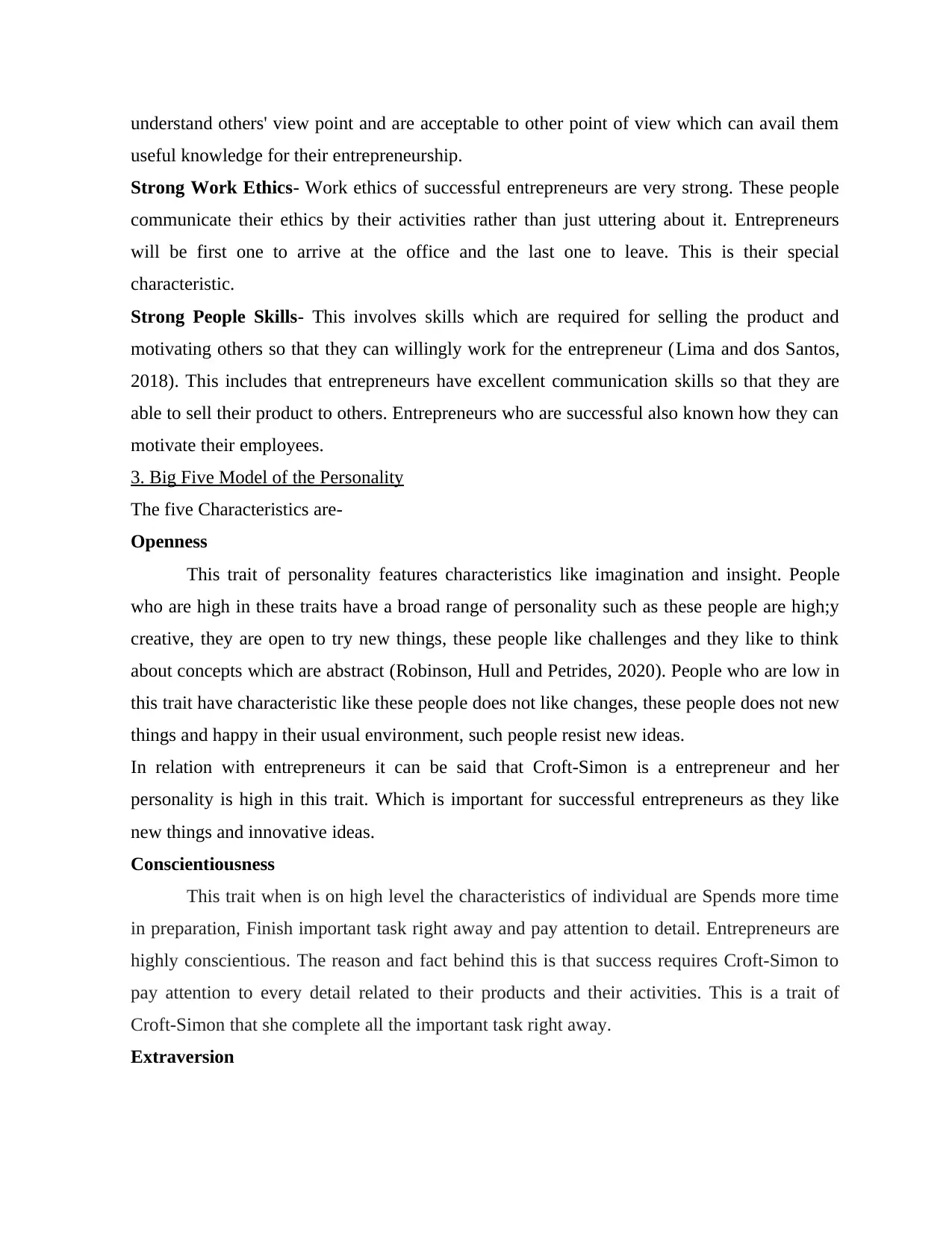
understand others' view point and are acceptable to other point of view which can avail them
useful knowledge for their entrepreneurship.
Strong Work Ethics- Work ethics of successful entrepreneurs are very strong. These people
communicate their ethics by their activities rather than just uttering about it. Entrepreneurs
will be first one to arrive at the office and the last one to leave. This is their special
characteristic.
Strong People Skills- This involves skills which are required for selling the product and
motivating others so that they can willingly work for the entrepreneur (Lima and dos Santos,
2018). This includes that entrepreneurs have excellent communication skills so that they are
able to sell their product to others. Entrepreneurs who are successful also known how they can
motivate their employees.
3. Big Five Model of the Personality
The five Characteristics are-
Openness
This trait of personality features characteristics like imagination and insight. People
who are high in these traits have a broad range of personality such as these people are high;y
creative, they are open to try new things, these people like challenges and they like to think
about concepts which are abstract (Robinson, Hull and Petrides, 2020). People who are low in
this trait have characteristic like these people does not like changes, these people does not new
things and happy in their usual environment, such people resist new ideas.
In relation with entrepreneurs it can be said that Croft-Simon is a entrepreneur and her
personality is high in this trait. Which is important for successful entrepreneurs as they like
new things and innovative ideas.
Conscientiousness
This trait when is on high level the characteristics of individual are Spends more time
in preparation, Finish important task right away and pay attention to detail. Entrepreneurs are
highly conscientious. The reason and fact behind this is that success requires Croft-Simon to
pay attention to every detail related to their products and their activities. This is a trait of
Croft-Simon that she complete all the important task right away.
Extraversion
useful knowledge for their entrepreneurship.
Strong Work Ethics- Work ethics of successful entrepreneurs are very strong. These people
communicate their ethics by their activities rather than just uttering about it. Entrepreneurs
will be first one to arrive at the office and the last one to leave. This is their special
characteristic.
Strong People Skills- This involves skills which are required for selling the product and
motivating others so that they can willingly work for the entrepreneur (Lima and dos Santos,
2018). This includes that entrepreneurs have excellent communication skills so that they are
able to sell their product to others. Entrepreneurs who are successful also known how they can
motivate their employees.
3. Big Five Model of the Personality
The five Characteristics are-
Openness
This trait of personality features characteristics like imagination and insight. People
who are high in these traits have a broad range of personality such as these people are high;y
creative, they are open to try new things, these people like challenges and they like to think
about concepts which are abstract (Robinson, Hull and Petrides, 2020). People who are low in
this trait have characteristic like these people does not like changes, these people does not new
things and happy in their usual environment, such people resist new ideas.
In relation with entrepreneurs it can be said that Croft-Simon is a entrepreneur and her
personality is high in this trait. Which is important for successful entrepreneurs as they like
new things and innovative ideas.
Conscientiousness
This trait when is on high level the characteristics of individual are Spends more time
in preparation, Finish important task right away and pay attention to detail. Entrepreneurs are
highly conscientious. The reason and fact behind this is that success requires Croft-Simon to
pay attention to every detail related to their products and their activities. This is a trait of
Croft-Simon that she complete all the important task right away.
Extraversion
Paraphrase This Document
Need a fresh take? Get an instant paraphrase of this document with our AI Paraphraser
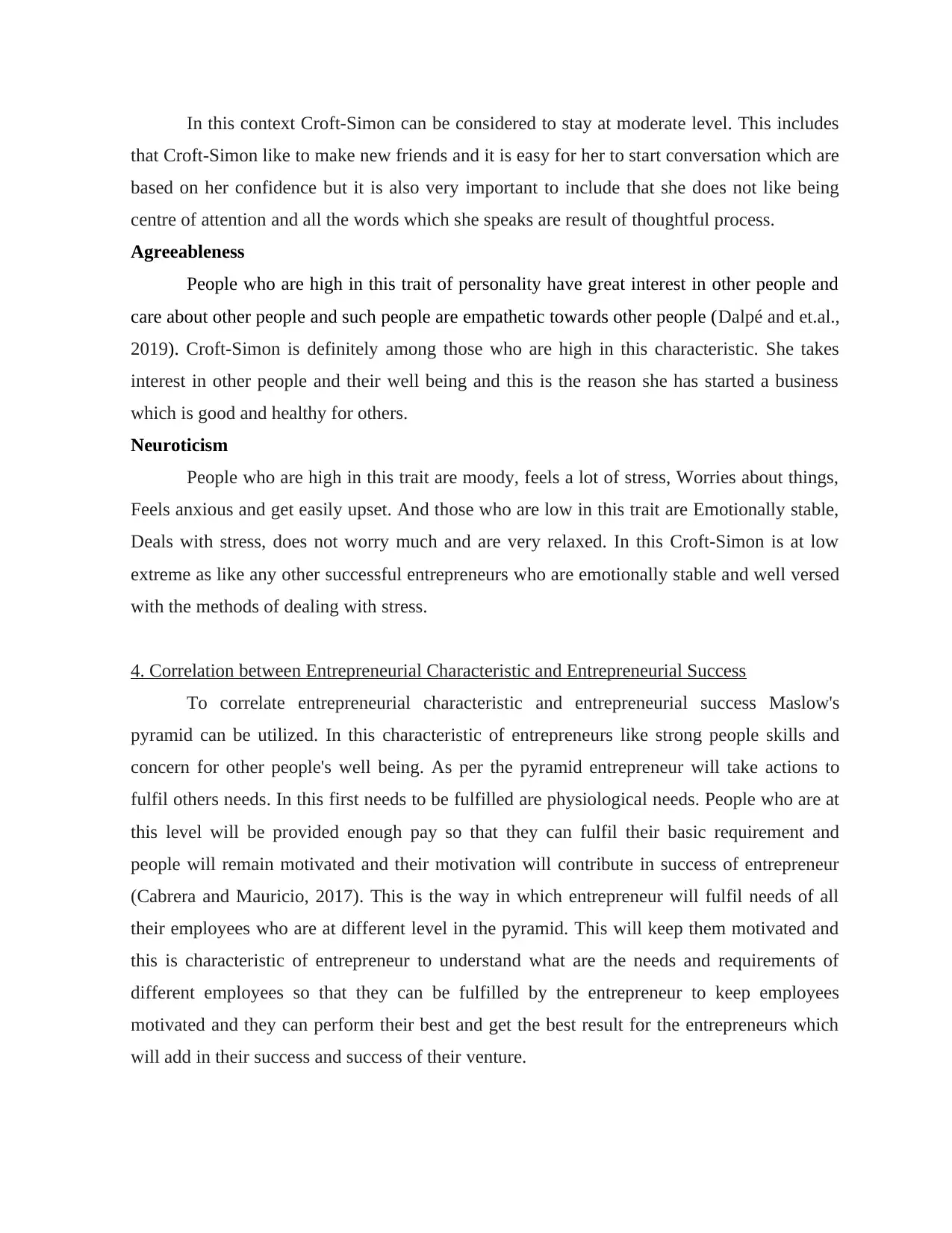
In this context Croft-Simon can be considered to stay at moderate level. This includes
that Croft-Simon like to make new friends and it is easy for her to start conversation which are
based on her confidence but it is also very important to include that she does not like being
centre of attention and all the words which she speaks are result of thoughtful process.
Agreeableness
People who are high in this trait of personality have great interest in other people and
care about other people and such people are empathetic towards other people (Dalpé and et.al.,
2019). Croft-Simon is definitely among those who are high in this characteristic. She takes
interest in other people and their well being and this is the reason she has started a business
which is good and healthy for others.
Neuroticism
People who are high in this trait are moody, feels a lot of stress, Worries about things,
Feels anxious and get easily upset. And those who are low in this trait are Emotionally stable,
Deals with stress, does not worry much and are very relaxed. In this Croft-Simon is at low
extreme as like any other successful entrepreneurs who are emotionally stable and well versed
with the methods of dealing with stress.
4. Correlation between Entrepreneurial Characteristic and Entrepreneurial Success
To correlate entrepreneurial characteristic and entrepreneurial success Maslow's
pyramid can be utilized. In this characteristic of entrepreneurs like strong people skills and
concern for other people's well being. As per the pyramid entrepreneur will take actions to
fulfil others needs. In this first needs to be fulfilled are physiological needs. People who are at
this level will be provided enough pay so that they can fulfil their basic requirement and
people will remain motivated and their motivation will contribute in success of entrepreneur
(Cabrera and Mauricio, 2017). This is the way in which entrepreneur will fulfil needs of all
their employees who are at different level in the pyramid. This will keep them motivated and
this is characteristic of entrepreneur to understand what are the needs and requirements of
different employees so that they can be fulfilled by the entrepreneur to keep employees
motivated and they can perform their best and get the best result for the entrepreneurs which
will add in their success and success of their venture.
that Croft-Simon like to make new friends and it is easy for her to start conversation which are
based on her confidence but it is also very important to include that she does not like being
centre of attention and all the words which she speaks are result of thoughtful process.
Agreeableness
People who are high in this trait of personality have great interest in other people and
care about other people and such people are empathetic towards other people (Dalpé and et.al.,
2019). Croft-Simon is definitely among those who are high in this characteristic. She takes
interest in other people and their well being and this is the reason she has started a business
which is good and healthy for others.
Neuroticism
People who are high in this trait are moody, feels a lot of stress, Worries about things,
Feels anxious and get easily upset. And those who are low in this trait are Emotionally stable,
Deals with stress, does not worry much and are very relaxed. In this Croft-Simon is at low
extreme as like any other successful entrepreneurs who are emotionally stable and well versed
with the methods of dealing with stress.
4. Correlation between Entrepreneurial Characteristic and Entrepreneurial Success
To correlate entrepreneurial characteristic and entrepreneurial success Maslow's
pyramid can be utilized. In this characteristic of entrepreneurs like strong people skills and
concern for other people's well being. As per the pyramid entrepreneur will take actions to
fulfil others needs. In this first needs to be fulfilled are physiological needs. People who are at
this level will be provided enough pay so that they can fulfil their basic requirement and
people will remain motivated and their motivation will contribute in success of entrepreneur
(Cabrera and Mauricio, 2017). This is the way in which entrepreneur will fulfil needs of all
their employees who are at different level in the pyramid. This will keep them motivated and
this is characteristic of entrepreneur to understand what are the needs and requirements of
different employees so that they can be fulfilled by the entrepreneur to keep employees
motivated and they can perform their best and get the best result for the entrepreneurs which
will add in their success and success of their venture.
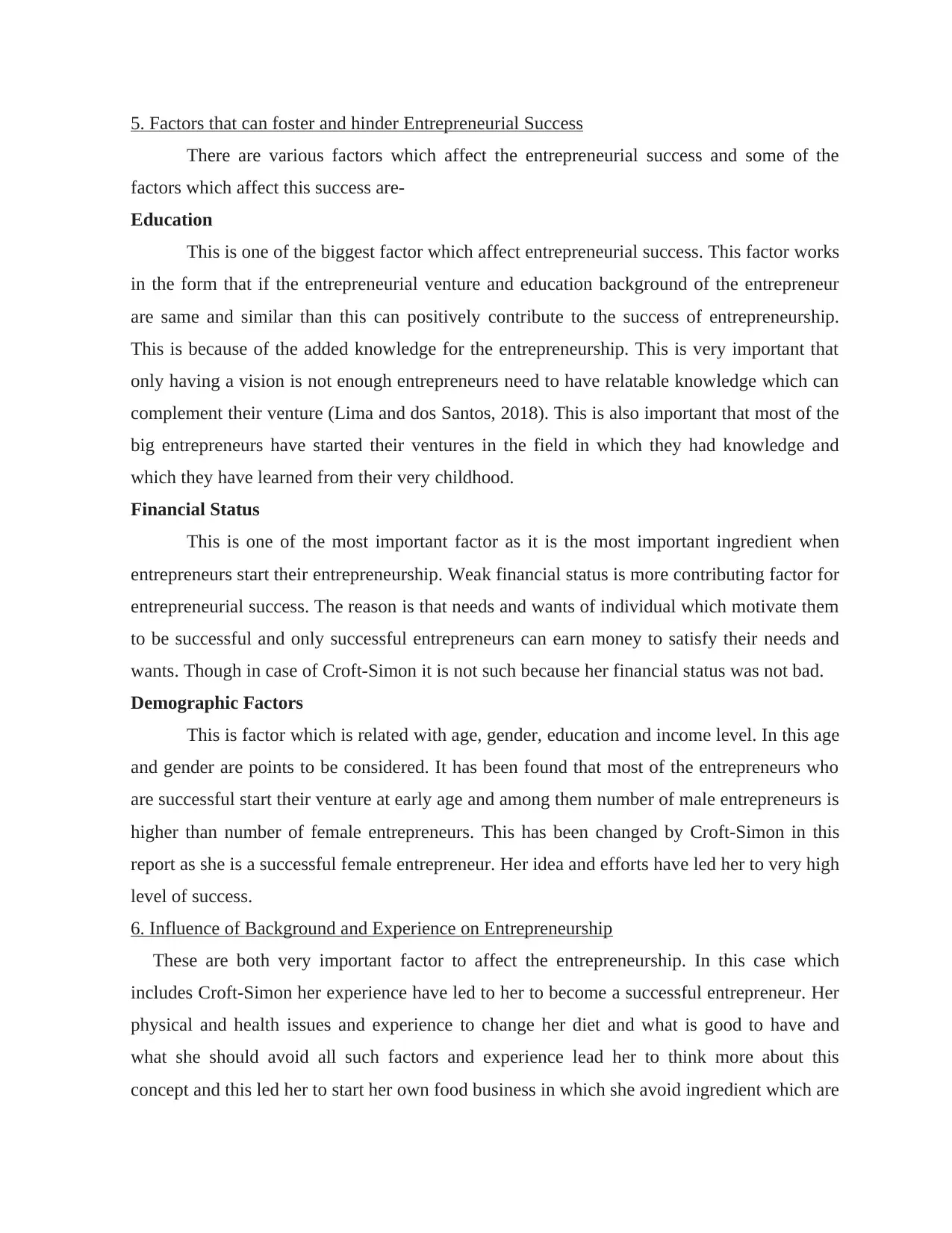
5. Factors that can foster and hinder Entrepreneurial Success
There are various factors which affect the entrepreneurial success and some of the
factors which affect this success are-
Education
This is one of the biggest factor which affect entrepreneurial success. This factor works
in the form that if the entrepreneurial venture and education background of the entrepreneur
are same and similar than this can positively contribute to the success of entrepreneurship.
This is because of the added knowledge for the entrepreneurship. This is very important that
only having a vision is not enough entrepreneurs need to have relatable knowledge which can
complement their venture (Lima and dos Santos, 2018). This is also important that most of the
big entrepreneurs have started their ventures in the field in which they had knowledge and
which they have learned from their very childhood.
Financial Status
This is one of the most important factor as it is the most important ingredient when
entrepreneurs start their entrepreneurship. Weak financial status is more contributing factor for
entrepreneurial success. The reason is that needs and wants of individual which motivate them
to be successful and only successful entrepreneurs can earn money to satisfy their needs and
wants. Though in case of Croft-Simon it is not such because her financial status was not bad.
Demographic Factors
This is factor which is related with age, gender, education and income level. In this age
and gender are points to be considered. It has been found that most of the entrepreneurs who
are successful start their venture at early age and among them number of male entrepreneurs is
higher than number of female entrepreneurs. This has been changed by Croft-Simon in this
report as she is a successful female entrepreneur. Her idea and efforts have led her to very high
level of success.
6. Influence of Background and Experience on Entrepreneurship
These are both very important factor to affect the entrepreneurship. In this case which
includes Croft-Simon her experience have led to her to become a successful entrepreneur. Her
physical and health issues and experience to change her diet and what is good to have and
what she should avoid all such factors and experience lead her to think more about this
concept and this led her to start her own food business in which she avoid ingredient which are
There are various factors which affect the entrepreneurial success and some of the
factors which affect this success are-
Education
This is one of the biggest factor which affect entrepreneurial success. This factor works
in the form that if the entrepreneurial venture and education background of the entrepreneur
are same and similar than this can positively contribute to the success of entrepreneurship.
This is because of the added knowledge for the entrepreneurship. This is very important that
only having a vision is not enough entrepreneurs need to have relatable knowledge which can
complement their venture (Lima and dos Santos, 2018). This is also important that most of the
big entrepreneurs have started their ventures in the field in which they had knowledge and
which they have learned from their very childhood.
Financial Status
This is one of the most important factor as it is the most important ingredient when
entrepreneurs start their entrepreneurship. Weak financial status is more contributing factor for
entrepreneurial success. The reason is that needs and wants of individual which motivate them
to be successful and only successful entrepreneurs can earn money to satisfy their needs and
wants. Though in case of Croft-Simon it is not such because her financial status was not bad.
Demographic Factors
This is factor which is related with age, gender, education and income level. In this age
and gender are points to be considered. It has been found that most of the entrepreneurs who
are successful start their venture at early age and among them number of male entrepreneurs is
higher than number of female entrepreneurs. This has been changed by Croft-Simon in this
report as she is a successful female entrepreneur. Her idea and efforts have led her to very high
level of success.
6. Influence of Background and Experience on Entrepreneurship
These are both very important factor to affect the entrepreneurship. In this case which
includes Croft-Simon her experience have led to her to become a successful entrepreneur. Her
physical and health issues and experience to change her diet and what is good to have and
what she should avoid all such factors and experience lead her to think more about this
concept and this led her to start her own food business in which she avoid ingredient which are
⊘ This is a preview!⊘
Do you want full access?
Subscribe today to unlock all pages.

Trusted by 1+ million students worldwide
1 out of 16
Related Documents
Your All-in-One AI-Powered Toolkit for Academic Success.
+13062052269
info@desklib.com
Available 24*7 on WhatsApp / Email
![[object Object]](/_next/static/media/star-bottom.7253800d.svg)
Unlock your academic potential
Copyright © 2020–2025 A2Z Services. All Rights Reserved. Developed and managed by ZUCOL.



